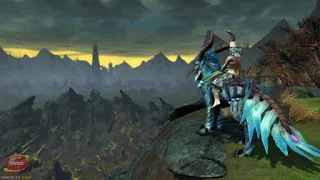As we discussed in our previous two articles, many factors contributed to the longevity and success of Rift online, and obviously, the continuous rolling out of new features and systems was one of these factors. Not all of these new systems were well received by the public though, however, that did not stop the developer from continuously looking to improve and to innovate. Indeed, from this point of view, Rift online has been the birthplace and proving ground of many a MMO innovation.
The Instant Adventure system was one of the features pioneered by the game. Instant Adventure is just what it says on the package: it is meant to make it as easy as possible for players to team up and to jump into an adventure. For some MMO players, searching out the adventure is half the fun, but according to the devs, that was not the case among Rift players. Instant Adventure mode is all about jumping into action at the press of a button and heading out to complete goals shared by a motley selection of teammates. Bailing out is just as easy and more importantly: guilt free. Instant Adventure takes place in the shared world (and that's where Rift turned out to be a trail-blazer), as well as in some of the in-game raids.
Another feature which turned out to be very popular with the Rift player-base, and which goes hand-in-hand with the above described Instant Adventure feature, is the mentoring/sidekicking system. Mentoring is about allowing the game to auto-balance one's higher-level character down to another player's lower level, so the two can play together and actually enjoy the action as peers. Sidekicking is the opposite of this system: it auto-balances a lower-level character up to another player's higher level, for the above described purposes.
Allowing people from both game-factions to play together through the Faction as Fiction system was another master-stroke by the devs.
Generally speaking, the game is all about erasing all boundaries. Indeed, the borders between the in-game worlds are largely illusory at this point. People can move freely among these worlds, and from one server to another. This is indeed the right solution for one of the most nagging MMO problems, so its popularity is quite self-explanatory really.
As said above though, not all the new features turned out to be popular with the player base. Moving away from the subscription-based monetization model was fraught with disappointment and frenzied solution-seeking for the team. Balancing out the continued creation of long-form expansions with the actual profits wasn't a small feat either. Along this path, there were - as the team puts it - some misalignments of expectations, but in the end, everything was smoothed over. The interesting thing is, that when it comes to the monetization of digital content, there are some very un-intuitive factors involved, as the team found out over the years. Furthermore, the optimal monetization-model is an ever-moving target, so keeping on top of it all the time is definitely no easy feat.
Online casinos have the opposite issue, monetisation of content is relatively simple, but in an increasingly competitive environment, keeping players happy and loyal to a specific brand is a challenge. Players are always looking for reputable online casinos with large games offerings, generous bonuses and loyalty programs, and because there are so many out there, switching from one casino to the next is not difficult to do. This makes player retention a priority.
Philip Thalberg has developed an interest in the esport world back in 2003, and he's been working for the world's top eSports destination since 2004.












0 comments:
Post a Comment